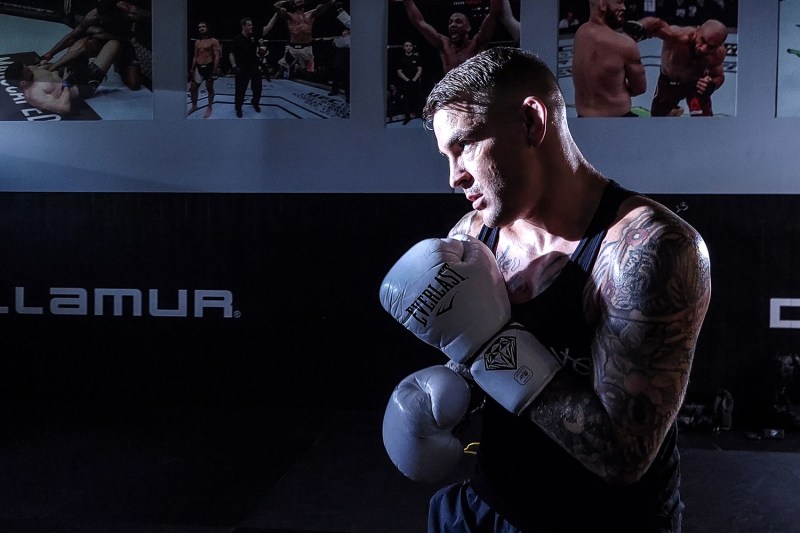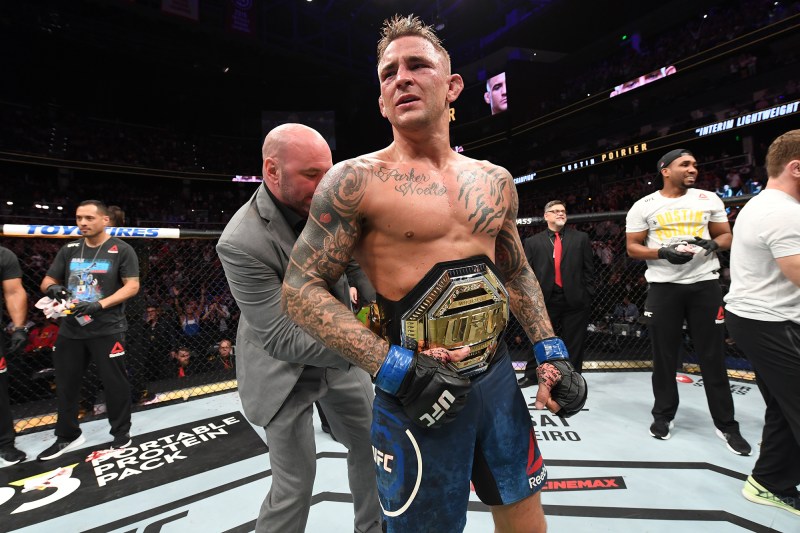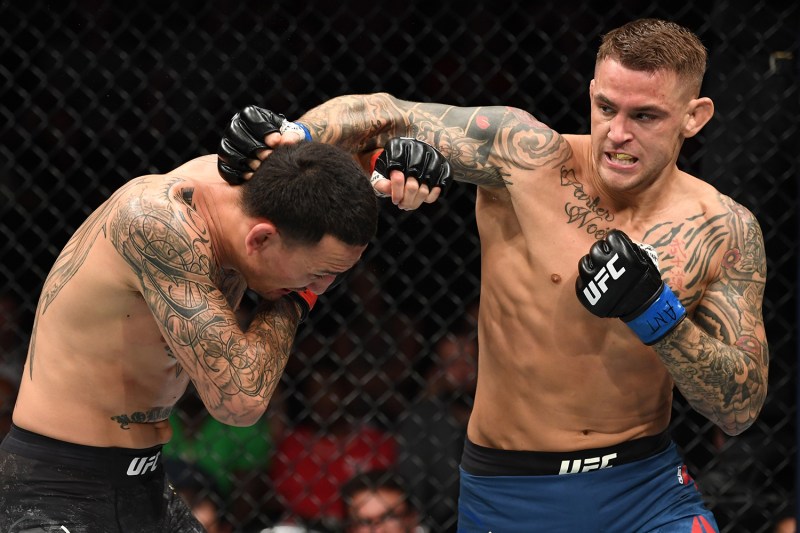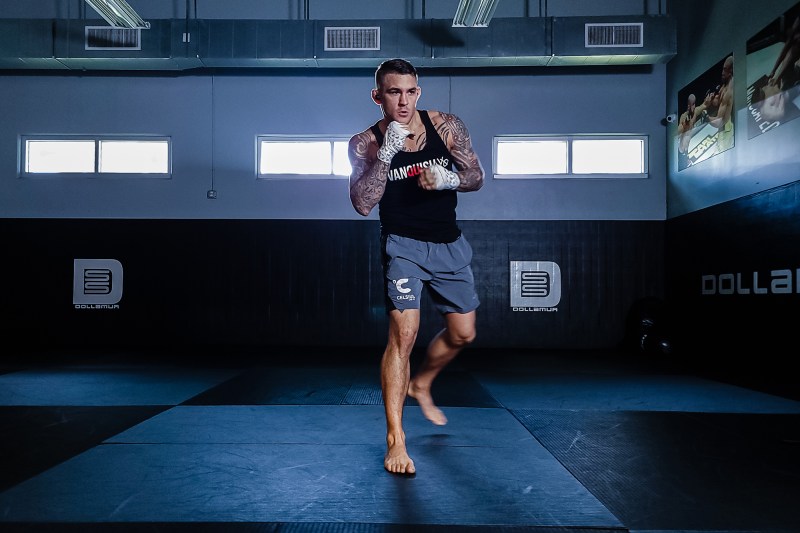
Dustin Poirier isn’t going to do this forever. The Lafayette, La., native says that up front. As the UFC’s top contender in the Lightweight division and sixth-ranked pound-for-pound men’s fighter, he’s been fighting professionally since 2009. Now, at 32, “I’m not going to do this until I’m 40, I can promise you that.”
When Poirier fights Conor McGregor on July 10, he is in for a very, very big payday. “It’s always great business to be a part of big fights, and this is going to be one of the biggest fights this year,” he continues, and he’s not lying: McGregor is the UFC’s biggest name and its only current crossover star. But after announcing his retirement in 2019 (he’s also done so in 2016, only to return), sparring with Floyd Mayweather, and embroiling himself in interactions with law enforcement for various rape and assault charges (all settled out of court), McGregor has returned to the octagon with mixed results.
Related Guides
A 40-second finish of journeyman and perennial stepping stone Donald “Cowboy” Cerrone in January 2020 seemed to indicate that McGregor hadn’t lost a step — that is, until he came up against Poirier next. From the start of the fight in January 2021, McGregor seemed to lack his trademark relaxed inquisitiveness, his probing, his measuring. And sure enough, come round two, Poirier seemed to throw the switch, deciding that the former division champ was a non-threat. He seemed to grow looser as McGregor, his lead leg kicked to a pulp, seemed to grow more desperate. The end came not with a Poirier coup de grace but with the stacking fists of an experienced fight: first a hooking right across the jaw, then a left cross, then left, right, another right square into the jaw. The blows came faster and faster from all angles, until McGregor slumped to the canvas, Poirier landed another right across the jaw for good measure, and ref Herb Dean interjected, waving it off. TKO, no country for formerly retired old men.
The result was vengeance for the pair’s first fight, in 2014 when the two were in division lighter and an ascendant McGregor, rising in prestige faster than the sport, knocked Poirier out in round one. But their matchup in January 2021 displayed the full mastery that Poirier has achieved in his 10 years the UFC’s octagon. July 10 will be the rubber match, the best two-out-of-three in the trilogy that would ultimately yield bragging rights, and Poirier wants to sell it as such. He sells it hard: “He knocked me out, I knocked him out,” he says. “We have to finish this thing out.”

But the reality is that there’s been a lot of water under the bridge since that initial 2014 contest. While McGregor was sucker-punching old men on barstools, Poirier was steadily rising, and over the past several years, he’s been near the top of the division, single-minded in focus, and currently all but division champ. In fact, he holds a higher spot on the UFC’s pound-for-pound rankings than his division’s new-minted division champ. The two have never fought. There is, in fact, only one hitch to Poirier’s rightful claim to its championship. And it was a big one.
In September 2019, Poirier was a seemingly irresistible force, but he paired with a truly immovable object in Khabib Nurmagomedov. Nurmagomedov, a Russian-born Sambo specialist with a gluetrap-like grappling style, made short work of him despite Poirier’s claim in the fight’s lead-up of answers and strategies. Well, Poirier’s preparation was as effective as Al Gore’s lockbox theory in in the 2000 presidential debates. And just like Gore, Poirier found himself overwhelmed and without answers. He was submitted in round three via rear naked choke.
Numagomedov was the longest-running division champ, reigning supreme from 2018 through 2021 despite other high-caliber challengers, but following the COVID-related death of his father in 2020, the 32-year-old fighter, still unbeaten, would retire in heartbreak despite plenty of monetary incentive to remain. His title was officially vacated in March, and the division’s not-quite-figurative stranglehold was suddenly loosened. Only because Poirier and the number-two-ranked man, Justin Gaethje, had both been the most recent Numagomedov casualties did the third- and fourth-ranked fighters, Tony Ferguson and Charles Oliveira, clash for the belt in May. Oliveira., an 11-year journeyman long, would claim it.

“[Numagomedov’s retirement is] a loss for the division. It’s a loss for the sport,” Poirier says. “Not too many guys make it out of this thing undefeated and on top, especially with the offers and opportunities he has.
“But the show must go on,” he continues. “We’ve got to find out who’s the best.”
Poirier, as the top-ranked contender in the division, is theoretically on deck for a title shot, and he knows it. “With a win on July 10 over Conor McGregor, I’m next in line for the title,” he says. “And in a perfect world, you go out there and you beat one of the biggest stars in the sport two times in a row, and then you win the belt, that’s a storybook—“
Poirier catches himself and doesn’t finish the phrase.
Because, at 32 years old, he does not want to be doing this forever, some shambling shell of a man like former UFC champ Chuck Liddell. A division belt is a hell of a way to go out, and winning a decisive match in a trilogy against someone that will define an epoch in the sport’s young history is a hell of a penultimate fight. One can almost see the sunset of Poirier’s own career, a championship to his credit, all his goals achieved. With his wife and his daughter, he’ll fly to Disney World in the morning.
But, when pressed, that’s not quite the ending Poirier sees for himself.

“The phrase that came to mind was ‘storybook ending,’ but [it’s] not ending,” he says. “I still feel good. I still feel healthy. We’ll see how these next few fights play out and take it from there, but I got a lot left to give.”
In advance of the McGregor fight, Poirier says his stock has reached greater heights than ever before. He was announced in June as a member of Samsung’s Team Galaxy, the first mixed martial arts athlete to be signed, and with his The Good Fight Foundation, he’s moving from strength to strength. The foundation’s efforts have moved from food banks to meals for hospital staff during COVID, and a few fights back he partnered with fellow MMA fighter Justin Wren’s Fight for the Forgotten to build wells for the forest people of the Congo (often referred to as Pygmies, though the term is disputed), along with purchasing 40 acres for their use. He’s doubling down with the Wren for the McGregor fight, bringing on boxing legend Manny Pacquiao to channel even more funds to build housing on that land as well as a pharmacy. “It’s going to be huge,” Poirier says. “We’re changing people’s lives, and it’s an honor to be [involved in] something like that. It’s bigger than fighting.”
But for Poirier, the task at hand is fighting. McGregor, coming off a loss, must know the only way to reestablish himself with fans and sponsors is a resounding win over the division’s top contender. “He’s still one of the most dangerous opponents out there,” Poirier says. “Whenever you take on tough fights like this, when you’re jumping to fight a guy who just knocked you out in two rounds, and you have all the money that you can spend, there’s got to be something in there.
“He’s obviously not doing this fight for money,” he continues. “He’s doing it because he really believes he’s going to beat me. And that’s motivation.”
Poirier may not have the splash of McGregor; despite a recent Instagram post where Poirier posted a photo of his fist indenting McGregor’s face and the caption, “And again July 10th,” he claims to have neither learned lessons from his foe’s showmanship nor share an enthusiasm for it.
“This is fighting,” Poirier says. “At the end of the day, we’re two men who are going to lock ourselves inside of an octagon and see who’s standing when the bell rings. I just try to put in the work, and put myself, mentally, physically, in the best position I can be to compete. And that’s about it.
“Winning solves everything,” he continues, “so I just got to win.”



